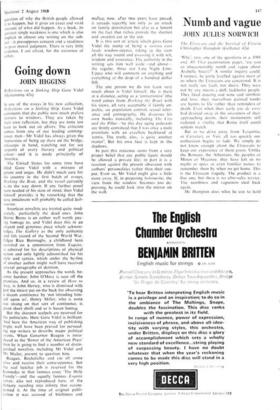Going down
JOHN HIGGINS
Reflections on a Sinking Ship Gore Vidal (Heinemann 63s) In one of the essays in his new collection, Reflections on a Sinking Ship, Gore Vidal comments that the public now much prefers mirrors to windows. They are taken by their own reflection, but they are none too keen to look out on affairs. The criticism comes from one of our leading conning- tower men—Mr Vidal has always given the impression of being up there on the bridge, telescope in hand, watching out for sea serpents of every literary and political colour—and it is made principally of America.
The United States for some time have filled Gore Vidal with a mixture of gloom and anger. He didn't much care for his country in the first batch of essays, Rocking the Boat, and the vessel currently is on the way down. If any further proof were needed of his state of mind, then Vidal himself provides it by remarking that the next instalment will probably be called Sub- marine.
American novelists are treated quite mod- erately, particularly the dead ones. John Horne Burns is an author well worth pay- ing homage to. and Vidal does this in an elegant and generous piece which acknow- ledges The Gallery as the only authentic and felt record of the Second World War. Edgar Rice Burroughs, a childhood hero revisited on a commission from Esquire, is admired for his descriptions of physical action and only lightly admonished for his style and syntax, which under the by-line of another author might well have received several paragraphs of derision.
As the present approaches the words be- come harsher. John O'Hara is seen off the premises. And so, in a review of Here to Stay, is John Hersey, who is dismissed with just the tiniest pat on the back for observing a decent continence by 'not intruding him- self upon us'. Henry Miller, who is none too strong on that sort of continence, is given short shrift and so is Susan Sontag. But the sharpest scalpels are reserved for the politicians. Here Gore Vidal is brilliant. And here the American way of publishing might well have been praised for persuad- ing top writers to describe major political events. When Governor Reagan is intro- duced to the `flower of the American Press' then he is going to find a number of distin- guished novelists, including Mr Vidal and Mr Mailer, present to question him.
Reagan, Rockefeller and Lizu all come alive and receive their come-uppance. But the real hatchet job is reserved for the Kennedys in that famous essay 'The Holy Family'—and the equally famous Esquire cover, alas not reproduced here, of the dynasty receding into infinity that accom- panied it, At the time of original publi- cation it was accused of bitchiness and
malice; now, after two years have passed, it rereads superbly not only as an attack on family domination but also as a lament on the fact that riches provide the shortest and sweetest cut to the top.
It is this sort of article which gives Gore Vidal the stamp of being a summa cum laude window-opener, taking in the view all the way round and assessing it with wit. wisdom and assurance. The authority in the writing sets him well aside—and above— the regular, three star Late Night Line- Upper who will comment on anything and everything at the drop of a hundred dollar bill.
The one person we do not learn very much about is Vidal himself. He is there at a distance, acting as a 'correctionise (the word comes from Rocking the Boat) with his views, all very acceptable if faintly an- archic, on population control, sexual toler- ance and pornography. He discusses his own books ironically, including The City and the Pillar—'to this day aging pederasts are firmly convinced that I was once a male prostitute with an excellent backhand at tennis- The truth, alas, is quite another matter'. But his own face is kept in the shadows.
In part this reticence stems from a very proper belief that any public figure should be allowed a private life; in part it is a reaction against the present obsession with authors' personalities rather than their out- put. Even so, Mr Vidal might give a little more away. lf, in preparing Submarine, the view from the window becomes too de- pressing, he could look into the mirror on the wall.


































 Previous page
Previous page